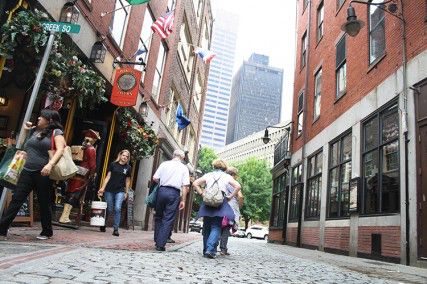
The City of Boston was selected as a recipient of a 2013 Transportation Investment Generating Economic Recovery grant on Friday, a program that funds infrastructure projects around the country to help bolster local economies and improve transportation.
“The Connect Historic Boston program attempts to link people who use [mass] transit, ride bicycles or walk to national historic sites in the downtown area,” said Vineet Gupta, director of planning for the Boston Transportation Department and head of the TIGER grant initiative for “Connect Historic Boston.”
Boston received the fifth largest grant out of the 52 projects in 37 states that received TIGER funds from the program. The grants were highly competitive in 2013, with a total of 585 applicants, according to the TIGER 2013 Awards factsheet.
“A family that might come by car normally should feel comfortable taking the train to North Station, and then being able to walk comfortably to the U.S.S. Constitution, to Faneuil Hall, to the Old State House and to other historic sites,” Gupta said.
Preliminary designs are already made for the projects, which will include adding lighting and signage to certain areas, expanding sidewalks and bike lanes and building cycle tracks, which are bike lanes that are removed from the road so they are not directly next to car traffic, according to the “Connect Historic Boston” website.
Boston Mayor Thomas Menino said in a Friday press release that visiting historical sites is an important part of Boston culture and maintaining the ways to access them is crucial.
“Boston is a beautiful, historic city and we need to do everything we can to design our streets and sidewalks in a way that increases transit, walking and bicycle access to our historic treasures,” he said.
“Connect Historic Boston” has been raising publicity for more pedestrian-friendly planning, through design competitions, public walks and bike rides, but Gupta said receiving the grant is only one piece of the plan.
“The second piece is to actually do some physical improvements, called streetscape improvements, to the streets that connect important transit stations to these historic sites and that’s what they’re going to use the money for,” he said.
Gupta said they have some ideas to improve areas like the Blackstone Block, Charles River Crossings and Joy Street.
“It’s as much for neighborhood residents of Boston as it is for tourists,” Gupta said. “The idea is that rather than drive, you should use public transportation or bicycles to visit our historic sites.”
Ben Goodman, president of Boston University Bikes Club, said expanding bike lanes in the city is an important step in the acceptance of bike travel.
“Just showing that bikes have ownership on the streets is really important,” he said. “The more bike lanes and signage that motorists see, the more aware they are that bikes have a presence in the city, and hopefully the more respectful they will be towards people who don’t drive.”
Tom Mehuron, 22, a researcher and resident of Brookline, said adding bike lanes will help encourage travel in parts of the city that will be improved by this funding.
“I think in terms of driving, Boston is a fairly inaccessible city, so getting better with biking is a good idea,” he said. “Even bolstering [bike infrastructure] a little bit would help.”
Curtis Coughlin, 49, an artist from Newton, said poor infrastructure often keeps him from biking in the city, despite it being his primary form of travel.
“I’m a pretty avid biker and one of the things I didn’t like about the city [when moving here] is the accessibility to bike lanes,” he said. “I’m a big fan of cutting down on wasting fuel, so I see that [the grant] as a very positive thing for Boston.”
This is an account occasionally used by the Daily Free Press editors to post archived posts from previous iterations of the site or otherwise for special circumstance publications. See authorship info on the byline at the top of the page.



